– Cultural exchange – Interesting examination – Hm, difficult to define. I think everybody (as the videoclip proves) has their own definition. I added parts from the interview I made with the Chinese women. 文化交æµ? I was thinking of the word äº¤æµ and it reminded me of the question where I asked to define “性交”. And in addition, I thought Ouyang’s definition of cultural exchange was also very special…and fits to this question.
mï¼šä½ æ˜¯æ€Žä¹ˆç†è§£åšçˆ±çš„ï¼Ÿä½ ä»‹æ„么?
interview1: ä½ æ˜¯æŒ‡ä¸¤ä¸ªå¥³ç”Ÿä¹ˆï¼Ÿæˆ‘ok的。如果抛开å•è‚²ä¸‹ä¸€ä»£è¿™ä¸ªæƒ³æ³•ï¼Œè¿™æ˜¯äººçš„基本的生ç†éœ€æ±‚,很æ£å¸¸ã€‚
mï¼šä½ è§‰å¾—åšçˆ±å’Œæ€§äº¤æ˜¯ä¸€ä¸ªæ„æ€ä¹ˆï¼Ÿ
interview1:我觉得æ„æ€å·®ä¸å¤šï¼Œæ˜¯ä¸æ˜¯ä¸€ä¸ªè¤’义一个贬义啊?呃…ä¸å¤ªçŸ¥é“。
m:为什么是性交会有贬义?那个性是指什么?交是交æµå—?
interview1:呃…交,交æ¢ä¸€ä¸‹ä¸œè¥¿å§ã€‚交æ¢ä¸€ç§æ„Ÿå—,一ç§ä½“验å§ã€‚å¯èƒ½æœ‰äº›æ„Ÿè§¦åªèƒ½æ˜¯é€šè¿‡å¼‚性æ¥å¸¦ç»™ä½ 的。
m:那如果是两个男人在åšçˆ±ï¼Œä½ å¯ä»¥ç”¨æ€§äº¤æ¥å½¢å®¹å—?
interview1:呃…..ä¸çŸ¥é“,应该å¯ä»¥å§ã€‚性没有规定是åªæœ‰å¼‚性之间的å§ï¼Œæˆ‘ä¸å¤ªçŸ¥é“这个è¯ç©¶ç«Ÿåº”该怎么定义。
m: 那对女的æ¥è¯´å·®ä¸å¤šï¼Œé‚£è‡ªæ…°æ˜¯åšçˆ±å—?
interview1:我觉得åšçˆ±æ˜¯ä¸¤ä¸ªäººçš„事情,而自慰是一个人的,å¯èƒ½æ•ˆæžœæ˜¯ä¸€æ ·çš„,但心里感觉ä¸ä¸€æ ·å§ã€‚
interview1: å› ä¸ºæ¯ä¸ªäººéƒ½å¯¹è‡ªå·±çš„身体很好奇,我觉得很æ£å¸¸ã€‚但是å¯èƒ½è‡ªæ…°è¿™ä¸ªè¯åœ¨æˆ‘è„‘æµ·ä¸å‡ºçŽ°çš„比较晚,所以我ä¸æ˜¯å¾ˆäº†è§£ï¼Œä½†æ˜¯å½“它出现的时候我还是å¯ä»¥æŽ¥å—的。å¯èƒ½å¦‚æžœå†å‡ºçŽ°çš„早一点,å°å¦åˆä¸çš„è¯ï¼Œæˆ‘å°±ä¸èƒ½å¤Ÿç†è§£ã€‚
mï¼šä½ èƒ½ç”¨ä½ è‡ªå·±çš„è¯æ¥è§£é‡Šä¸€ä¸‹â€œåšçˆ±â€æˆ–者“性交â€å—?
interview2:是åè¯è§£é‡Šå—?就是很自然的一ç§è¡Œä¸ºå§ã€‚然åŽï¼Œé‚£æ˜¯ç”Ÿæ´»çš„一部分。è¬å¦‚è¯´ï¼Œå¦‚æžœä½ æŠŠå…´è¶£çˆ±å¥½å’Œå·¥ä½œæ”¾åœ¨ä¸€èµ·ï¼Œç„¶åŽä½ 的感情生活和性生活åˆæ˜¯ä¸€å—东西。如果说定义的è¯ï¼Œå°±æ˜¯ç”Ÿæ´»çš„一部分而已,没觉得有太多别的东西… 其实我也ä¸æ˜¯ç»å¸¸ä¼šæœ‰è¿™æ ·çš„ä½“åŠ›æ´»åŠ¨ï¼Œä½†æ˜¯æˆ‘ä»¬éƒ½ä¼šå¸Œæœ›ä¼šæœ‰ä¸€ä¸ªç¨³å®šçš„ä¸œè¥¿ï¼Œå› ä¸ºé‚£æ ·â‹¯â‹¯å°±åƒæˆ‘之å‰è·Ÿä½ è¯´è¿‡çš„ï¼Œæˆ‘è§‰å¾—ä¸¤æ ·ä¸œè¥¿æ˜¯ä¸å¯ä»¥åˆ†å¼€çš„ã€‚ï¼ˆæ€§ï¼‰æ˜¯ä¸€ä¸ªä½ å¸Œæœ›å®ƒèƒ½å¤Ÿç¨³å®šè€Œæœ‰æ•…äº‹çš„ä¸œè¥¿ã€‚å¦‚æžœéžè¦è§£é‡Šçš„è¯ï¼Œæˆ‘会觉得是一ç§å¿…需å“,ä¸ä¸€å®šåœ¨æ¯ä¸ªé˜¶æ®µéƒ½ä¼šå‡ºçŽ°ï¼Œä½†æ˜¯å®ƒä¼šæ˜¯å¿…需å“。
mï¼šä½ è§‰å¾—â€œåšçˆ±â€å’Œâ€œæ€§äº¤â€çš„æ„æ€æ˜¯ä¸€æ ·çš„å—?
interview2:我觉得“性交â€ä¹ŸåŒ…括动物对å—,但“åšçˆ±â€æ˜¯äººæ‰ç”¨çš„ï¼Œä½ ä¸ä¼šè¯´ï¼Œåœ¨è¡—上看到两æ¡ç‹—在åšçˆ±ã€‚哎,但是也å¯ä»¥ï¼Œå¥½åƒä¹Ÿå¯ä»¥è¿™ä¹ˆè¯´ã€‚“性交â€æ„Ÿè§‰æ˜¯å†™åœ¨ä¹¦ä¸Šçš„å—…“性交â€å¬èµ·æ¥æœ‰åŠ¨ç‰©æ€§ã€‚ä½ ä¸ä¼šè·Ÿä½ 的男朋å‹è¯´ï¼Œæˆ‘们æ¥â€œæ€§äº¤â€å§ï¼Œä½ 会觉得这å¥è¯è¯´å‡ºæ¥ç‰¹åˆ«æ¥žã€‚ä½†ä½ ä¼šè¯´ï¼Œæˆ‘ä»¬â€œåšçˆ±â€å§ã€‚
Posted by mon | reply »women chopping wood




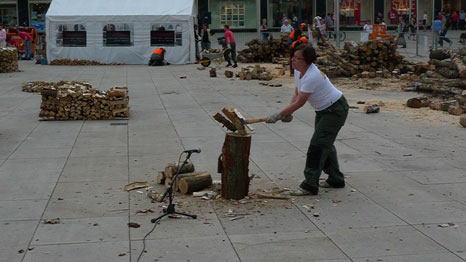

a live installation by choreographer Dorte Olesen, yesterday in alexanderplatz, berlin:
“15 Swedish women will travel to Berlin to meet a group of German women. They will have three days to complete their task: transforming 30 cubic metres of logs into imaginative woodpiles. The challenge includes co-operation, communication and getting to know one another across language and national barriers.”
Posted by f | more »å¥³æ³‰ä¸»ä¹‰
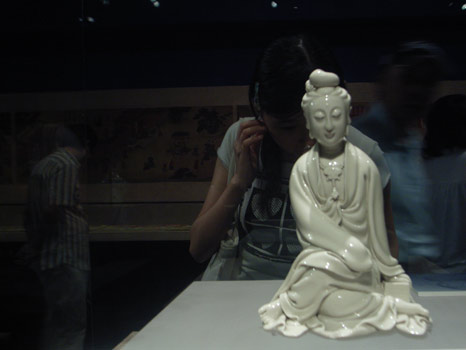
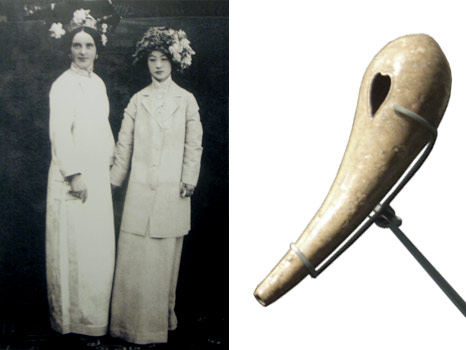
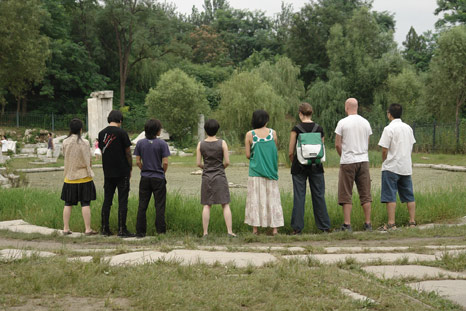
手势检查第二: æ‹å¤´å‘ | gesture study 2: hair-ing
ç†å˜å¥æ›² variations on lÇ
filmed in new york city, autumn 2006. summer 2008 finally got around to… thank you sim-chan and aka-chan and D-chan!
Posted by 丫 | reply »for severality, on fragility 1
To sustain fragility, a stamp on the box or the curiosity of half-opened contents. She says it is a trauma, beyond or prior to event, infliction in mere seconds or unconscious years, is p(h)ys(ch)ical.
 He shudders in late afternoon half-sun. Sometimes, somewhere else and longing to be repeated, never repeated, she recoils, not horror. Those prickling sparks of the nerves they call falling asleep, …i’m exhausted.
He shudders in late afternoon half-sun. Sometimes, somewhere else and longing to be repeated, never repeated, she recoils, not horror. Those prickling sparks of the nerves they call falling asleep, …i’m exhausted.
Fragility means that you might find yourself not on the subjective level (coming, pre-, before you), we are partial to (one another) and we are partial (a many subjectivities). The pieces lay strewn and ambitious! What is already fragmented can beg a prism-like movement, sometimes slight twisting of the wrist to open a new light, from Levinas’ very first illumination (but in the refusal of darkness).
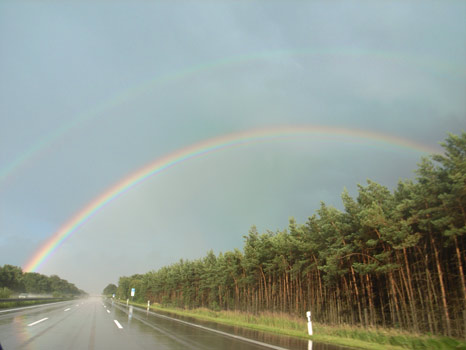 Once we saw three at once, a tunnel lining an enormous thundering sky, and we drove through them all.
Once we saw three at once, a tunnel lining an enormous thundering sky, and we drove through them all.
—-not a means to an object, we pass through what passes through us. Fragility, the broken glass after the break, under but begging the open, makes transparent without needing to be seen. But it is not concealment as such (those chatting at the bar simply do not notice), nor a state to induce fascination (stillness, displacing life) so much as laying bare, not bare or just being there, in the middle of an ongoing process. The prolongation of fragility is not a state of being, but may find itself in the invisible inconsistencies of ritual, the anticipation or the suspension of an event. Its fascinance can never be an isolated moment, for it can only exist in relation to the other, as cause or affect or the relinquishing notion of wanting to be part of all of you. That longing, whether in pain or love, is more real that real itself, for it is the realm of the possible-not-yet.
 Fucking phantasy! I owe you one.
Fucking phantasy! I owe you one.
1 Martin Hielscher, Hiroaki Kanai, Sean Smith, Fotini Lazaridou-Hatzigoga, Pierre Huyghe, Bracha Ettinger
Posted by 丫 | reply »ä»–说女æƒ

他说的,太… 什么的,所有å°ä¸œè¥¿æ”¾äº†æ£å¥½ï¼Œæˆ‘们æ¯ä¸€ä¸ªéƒ½æœ‰æ£å¥½çš„ä½å。她的头å‘散了好看一点。 所有的东西之间都有点间隙,空间的,时间的。冬天也有花开。没想到云雪的天也开冷朗的一ç§é»„色。这也æ„外的,çªç„¶åœ¨æ±Ÿè¾¹å¼€å§‹åŒ–妆。所有是上下文的。我们å–咖啡。æ¢ä½å。èŠã€‚那个å—是flaneur. 但ä¸çŸ¥é“flaneur有没有包括女的。我们都有æ£å¥½çš„ä½åå—?
冬天也有花开…
Posted by 丫 | reply »after “The Laugh of the Medusa”: Je suis femme, mais ceci n’est qu’une tentative l’écriture féminine (still learning)
When she was young, she wanted to be a writer. She wasn’t yet a woman, and thus had not yet learned of what she was capable, and of what she shouldn’t be capable. When one is young, emotions and outbursts and all of the new knowledge of the world flow freely as growth, sexless and unafraid. When one is an infant, there is nothing more enchanting, more delicious, more upsetting, or more terrifying than that of the present moment; this is the fearlessness of childhood feeling. Her words, as intensities, would do that to her, unleashed like her stories and streams and “a world of searchingâ€.
But it was ironically when she entered the university that she was suddenly labeled a foreigner in her world of words. Not to say she wasn’t included. She could now count herself equally among the Others: female and foreign.![]() Not until many years later did she realise that this was how easy it had been to shut her up! Her youthful a-sex grew out of her body, and she grew into her silence instead. The spaces within her head had always been loud, but now the reverberations cancel one another so that she forgets, so that she-grown-up-into-woman grows into herself, and that writing that had previously inscribed her childhood fantasies now inscribes into itself, disappearing like the folds of kneaded dough that slowly squash themselves with each turn of the baker’s hand.
Not until many years later did she realise that this was how easy it had been to shut her up! Her youthful a-sex grew out of her body, and she grew into her silence instead. The spaces within her head had always been loud, but now the reverberations cancel one another so that she forgets, so that she-grown-up-into-woman grows into herself, and that writing that had previously inscribed her childhood fantasies now inscribes into itself, disappearing like the folds of kneaded dough that slowly squash themselves with each turn of the baker’s hand.![]() It was in this sense that she lost the ability to write herself. Writing, as in the inscription of mind to her body, such that each was closed in turn (“Censor the body and you censor breath and speech at the same timeâ€). She had not the idea, young woman, where it was she should find herself: in mind, in body, in words. She had learned to segregate her many selves along this process of becoming woman, because that is the nature of woman, giver, to be able to be “for you what you want me to be at the moment you look at me in a way you’ve never seen me before: at every instant.†At every instant she gives herself away; she, escapee of herself.
It was in this sense that she lost the ability to write herself. Writing, as in the inscription of mind to her body, such that each was closed in turn (“Censor the body and you censor breath and speech at the same timeâ€). She had not the idea, young woman, where it was she should find herself: in mind, in body, in words. She had learned to segregate her many selves along this process of becoming woman, because that is the nature of woman, giver, to be able to be “for you what you want me to be at the moment you look at me in a way you’ve never seen me before: at every instant.†At every instant she gives herself away; she, escapee of herself.![]() But to where would she escape? And if she was constantly running, would she ever find? Or does finding necessitate the specificity of time-space-body-mind-word? (“The woman arriving over and over again does not stand still.â€) She wanted to be everywhere, just as she wanted to be everyone, to be that “desire-that-givesâ€. There is a balance to be had in the giving of herself and finding it in anOther. But perhaps she had given herself away too much already.
But to where would she escape? And if she was constantly running, would she ever find? Or does finding necessitate the specificity of time-space-body-mind-word? (“The woman arriving over and over again does not stand still.â€) She wanted to be everywhere, just as she wanted to be everyone, to be that “desire-that-givesâ€. There is a balance to be had in the giving of herself and finding it in anOther. But perhaps she had given herself away too much already.![]() In being everyone, everywhere, in wanting to love, she could not clearly differentiate anymore, because “she doesn’t ‘know’ what she’s giving, she doesn’t measure itâ€. She was paralysed in that flight. Her communication fell through to a generalised dis-course (lack of inter-course!). She had lost her voice. She had given herself up to the signifiers speaking through her.
In being everyone, everywhere, in wanting to love, she could not clearly differentiate anymore, because “she doesn’t ‘know’ what she’s giving, she doesn’t measure itâ€. She was paralysed in that flight. Her communication fell through to a generalised dis-course (lack of inter-course!). She had lost her voice. She had given herself up to the signifiers speaking through her.![]() (“In one another we will never be lacking.â€) This consoled her. But it still gave no indication of direction, or balance, her own becoming, and said nothing of where, and how much “she comes in, comes-in-between herself me and youâ€. But if we can no longer distinguish between ourselves and the Others, she thought, if there is no outside, no distinction, no sex——then maybe we can simply lay equally, yes, “in one anotherâ€. Multiplicitous, such that there is nothing given that is not also received——not in order to, but simply, in between ourselves, me and you. This does not imply a disappearance of either identity but a recovery of the Self in the Other. Giving then outlines a wholly newfound space, still, without the requirements of preposition, the directions from you, toward me or at you. Giving, like words as they are being put to paper: “We’ve come back from always.â€
(“In one another we will never be lacking.â€) This consoled her. But it still gave no indication of direction, or balance, her own becoming, and said nothing of where, and how much “she comes in, comes-in-between herself me and youâ€. But if we can no longer distinguish between ourselves and the Others, she thought, if there is no outside, no distinction, no sex——then maybe we can simply lay equally, yes, “in one anotherâ€. Multiplicitous, such that there is nothing given that is not also received——not in order to, but simply, in between ourselves, me and you. This does not imply a disappearance of either identity but a recovery of the Self in the Other. Giving then outlines a wholly newfound space, still, without the requirements of preposition, the directions from you, toward me or at you. Giving, like words as they are being put to paper: “We’ve come back from always.â€
And suddenly, she thought to write everything down…
——–
[All quotes taken from Hélene Cixous, “Le rire de la méduse”, 1975]
Posted by 丫 | reply »